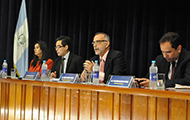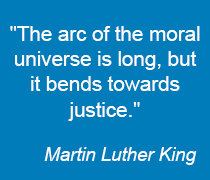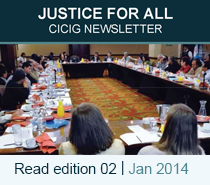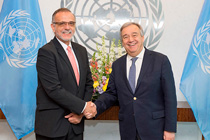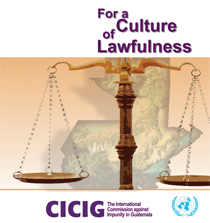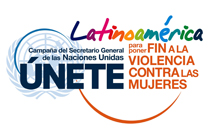 Guatemala, October 16, 2012. A political and academic forum was recently held, titled "Challenges to End Impunity in Central America: A Discussion Based on the Experiences of CICIG and the MP", where Commissioner Francisco Javier Dall'Anese Ruiz and Attorney General Claudia Paz y Paz tackled issues such as the 'shakedown' of judges and prosecutors, achievements inherited from their predecessors and the role of the Army.
Guatemala, October 16, 2012. A political and academic forum was recently held, titled "Challenges to End Impunity in Central America: A Discussion Based on the Experiences of CICIG and the MP", where Commissioner Francisco Javier Dall'Anese Ruiz and Attorney General Claudia Paz y Paz tackled issues such as the 'shakedown' of judges and prosecutors, achievements inherited from their predecessors and the role of the Army.
The event was organized by the Dutch Platform against Impunity, with the support of the Embassy of the Kingdom of the Netherlands and the Office of the High Commissioner for Human Rights.
The Attorney General stated that the Public Prosecutor's Office (MP), the Judiciary (OJ) and the International Commission against Impunity in Guatemala (CICIG) are responsible for conducting a 'shakedown' of the judicial institutions' judges, prosecutors and police in an effort to create more independent and efficient bodies.
Strengthening
Commissioner Francisco Dall'Anese Ruiz declared that the following are necessary to strengthen the justice system:
- Judicial independence
- Irremovability of judges
- Judicial service
- Disciplinary regime
Paz y Paz stressed the importance of the Commission's cooperation in contributing to enhancing the work of these institutions. "In 2007 when CICIG was created, impunity levels were high as far as solving crimes against life is concerned; a few weeks ago, the Mirna Mack Foundation produced a report indicating the increased effectiveness of the MP in solving such cases," stated the head of the MP.
The Commissioner explained that the independence and irremovability of judges, a judicial service and a disciplinary regime are all key to strengthening justice institutions and ensuring a continual removal of officials who breach the law or fail to fulfill their duties.
"Justice officials must work without fearing the institutions or prosecution, thus an effective bubble of justice protection must be created and the law must be enforced without any discrimination. In consequence, constitutional reform is necessary to grant judges and the Attorney General of the Republic true independence," he affirmed.
Achievements
In relation to the achievements of her predecessors, the Attorney General emphasized that the former Attorney General, Amílcar Velásquez Zárate, defended the Anti-organized Crime Law, which has been of great assistance in prosecuting organized crime. The law had been passed in 2006; however, at the time, there was "strong reluctance" to enforce it.
"A second important legacy left behind by my predecessor is the work team, because when I came to the MP, I encountered prosecutors who were committed to prosecuting crimes," she added.
The Commissioner affirmed that the work of former Commissioner Carlos Castresana's was positive, because when he was at the head of CICIG, he gave a "wake-up-call to Guatemalans through a series of public complaints and public appearances, and he led the population to demand appropriate justice for solving cases."
He continued to say that, in addition to this, the former head of CICIG left behind a team comprised of financial and criminal analysis units, lawyers, investigators and security agents. Castresana also achieved good coordination with the former administration's authorities, making it possible to progress with the Commission's cases.
Security
The Commissioner indicated that the role of the Army is to defend the borders of a country from foreign powers and not to intervene in criminal prosecution affairs or crime prevention.
He explained that the military has a doctrine of "win or die", whereas the police doctrine seeks to reduce crime and address social conflicts. Therefore, the Commissioner said that police affairs and military strategy should not be mixed, because they respond to different goals and objectives.
Attorney General Paz y Paz believes that the military should offer support in certain extreme security situations, especially in border zones; however, the National Civil Police (PNC) and the MP must carry forward the fight against criminality alone.
"By coordinating our actions with the police investigators it has been possible to make progress with crime prosecution. Therefore, I believe we have been more effective in the fight against organized crime, and we have conducted thorough investigation work to make it possible to carry out successful operations against criminal structures," she stated.
She added that a country benefits from the respect for the rule of law, because if justice is equal, the population will have greater trust for justice institutions.


